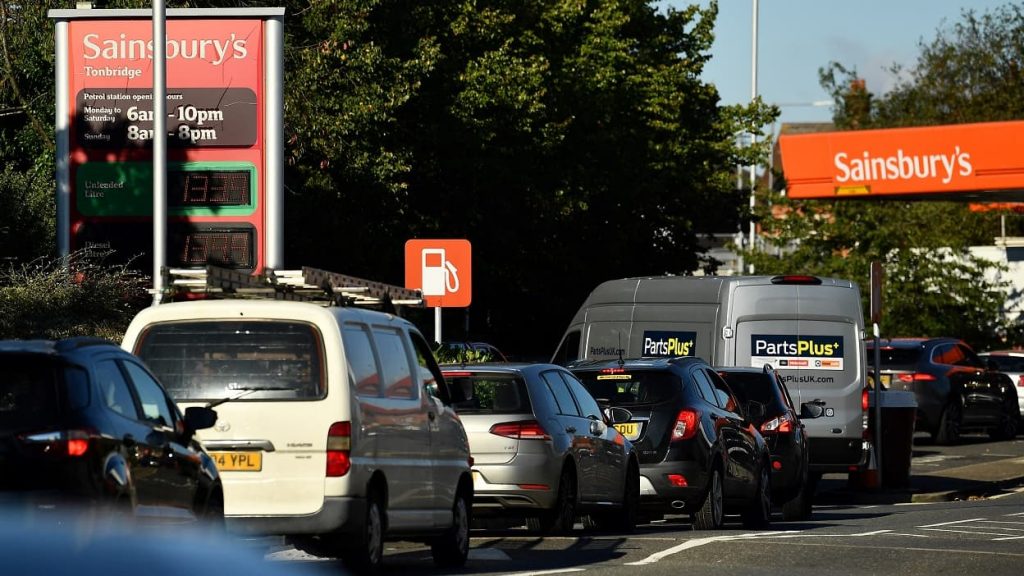
The government asks the army to stand ready for fuel shortages
Britons, worried about the fuel crisis, rushed to service stations on Monday. The effect of “panic buying” exacerbated the gasoline shortage.
The United Kingdom on Monday called on its military to stand ready to help with the country’s ongoing fuel crisis, after a weekend in which anxious Britons rushed to gas stations, leaving many dehydrated.
“A limited number of military tanker drivers should be prepared to intervene and deploy if necessary to stabilize fuel supplies,” the Energy Department said in a statement Monday evening.
The UK’s petrol shortage worsened on Monday, still under the influence of “panic buying” from anxious motorists.
“I must have made five different gas stations” and “my tank is almost dry,” said Lisa Wood, a motorist who waited for more than an hour at a gas station near the famous London Bridge in the heart of London.
And to say to the driver who wants to pass in front of everyone: “Go back to the end of the line, I’ve been there for barely five minutes!”. Between honking and cursing, Lisa admits it’s “not too British” to be excited, but “when there’s a crisis, you’re not too British anymore.” At another service station, east London, a line of 50 cars stretched out as early as 6:30 am on Monday, as customers spent part of the night waiting.
Medical organizations concern
Across the country, signs of “gas out” or “out of service” are proliferating near gas pumps, with about 30% of BP’s giant stations affected by fuel shortages. Some British media have published videos of excited drivers crashing near pumps for fear of breaking down or not being able to go to work.
If medical organizations are sounding the alarm about the difficulties caregivers have in traveling to see their patients, some schools are considering returning to distance education if the problem persists.
According to the PRA, one fuel distributor association, up to two-thirds of its members (5,500 independent locations out of a total of 8,000 stations in the country), ran out of fuel on Sunday, “while the others were nearly dry.” But the association says it expects “a possible easing of demand and normalization of inventory in the coming days.”
The crisis has been going on for nearly a week
On Monday, sector representatives once again wanted to reassure them that there was “full fuel at British refineries”.
The situation is reminiscent of the gasoline rationing during the energy crisis of the 1970s, or the refinery clogging that paralyzed the country for weeks in the early 2000s.
The crisis began in the middle of last week after a confidential BP report was leaked to the government, describing a few dozen gas stations closing due to fuel shortages, as a PRA representative lamented.
Late deliveries and product stock depletion
Panic buying quickly took off across the country and the majority of gas stations are now affected. The lack of gasoline or diesel was initially due to a shortage of truck drivers to transport it from storage stations to the pumps.
The problem is also affecting the shelves of supermarkets, fast food restaurants, bars and bike sellers, among others, denouncing delays in delivery and depleting stocks on some products.
The shortage of truck drivers has persisted for several months due to the combined pandemic and Brexit, with Labor accusing Boris Johnson’s Conservative government of ‘sleeping at the wheel’ and not interfering before.
The shutdowns have prompted some European drivers to return home, and tens of thousands of others have been unable to pass licenses for heavy goods vehicles because screening centers have been closed for months.
The government denies any impact of Britain’s exit from the European Union
Brexit also complicates immigration procedures as European workers previously moved freely. However, the government denies the impact of Brexit in the current crisis, saying that European countries are also facing a shortage of drivers, but the UK Road Transport Association makes it one of the main causes of the problem, according to a report published last month.
In search of solutions, London decided on Saturday to adjust its post-Brexit immigration policy and grant up to 10,500 three-month work visas to make up for the shortage of truck drivers as well as employees in key economic sectors such as poultry farms.
The British Poultry Council welcomes these measures but hopes it is not “too little too late”. For its part, BP warned that it would take “time for the sector to boost deliveries and replenish stocks”.

“Unapologetic pop culture trailblazer. Freelance troublemaker. Food guru. Alcohol fanatic. Gamer. Explorer. Thinker.”
